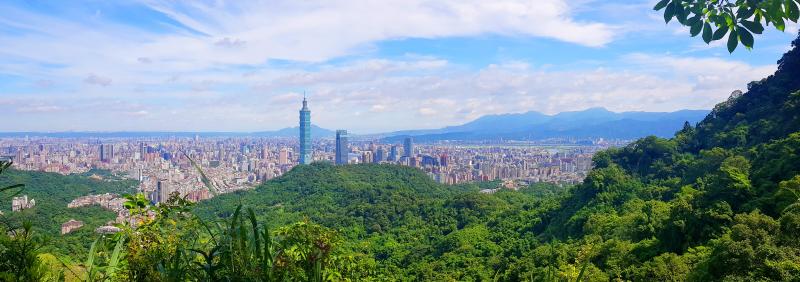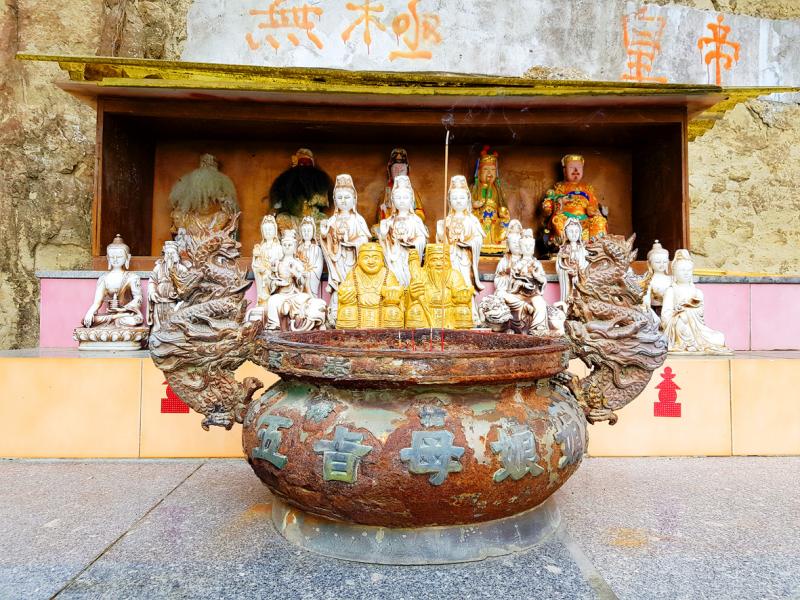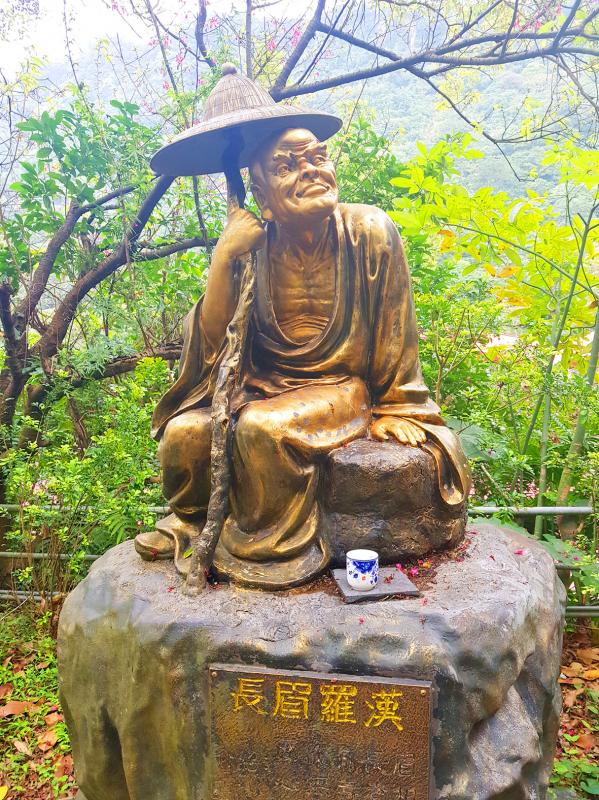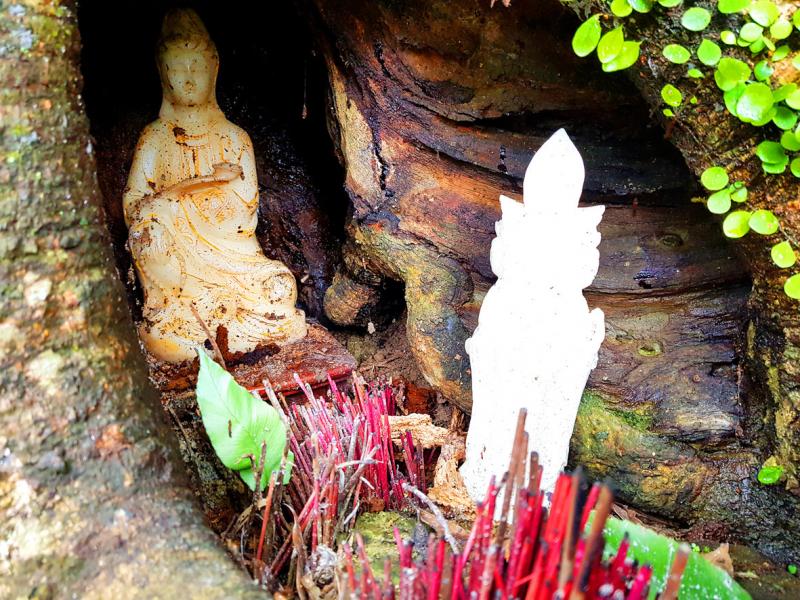Only when I reach a rest area on Muzhi Mountain (拇指山) do I realize how out of control mountain assholes have become. An elderly man dressed in a dirty white undershirt and brown slacks is waving around a mobile phone incongruously blaring Buddhist music, the southeastern part of the Taipei basin serving as the backdrop. The younger man opposite, outfitted in trendy hiking apparel, is thrusting his Mandopop-blaring mobile phone into the other man’s face.
“Turn it off,” Buddha growls.
“I was here first,” Mandopop replies.

photo: Noah Buchan, Taipei Times
“This music is sacred to the mountain,” Buddha yells.
It doesn’t occur to either of them to turn off their music. They also seem oblivious to the half-dozen onlookers, some of whom are capturing the scene on their phones. On and up I climb, wondering if Buddha vs Mandopop would become a headline later that day.
This story was originally sketched out as a travel piece about the ease and convenience of climbing Taipei’s Elephant Mountain, as well as Muzhi Mountain and the 95 Peaks (九五峰) beyond it. And to a certain extent it still is. But there is something that all climbers seeking tranquility on the trail should be made aware of: the racket of mobile phones and radios — and the assholes who wield them.

photo: Noah Buchan, Taipei Times
A moderately easy climb for those of any age, I’ve scaled the three mountains half a dozen times since COVID-19 struck in January, not having climbed them for years. From the base of Elephant Mountain, conveniently located 10 minutes on foot from the eponymously named MRT station, up to Muzhi Mountain and 95 Peaks and down the other side to the China University of Science and Technology (中華科技大學) in Nangang District (南港) takes less than three hours, walking at a moderate pace and taking time to rest, soak in the spectacular views of Taipei and snap photos.
With every trip, however, I’ve noticed — especially on weekends — the discordant sounds of news programs or political talk shows, YouTube videos or music blaring up the path behind me, and then further up the mountain as they pass. How news of the latest political controversy or celebrity scandal serves to relax is anyone’s guess.
According to Assholes: A Theory, a treatise on the subject by philosopher Aaron James, an asshole is a person who feels that he (and yes, assholes are usually men, almost by definition) should enjoy special advantages and does so out of a sense of entitlement — one who is immune to others calling out their assholic behavior.

photo: Noah Buchan, Taipei Times
Buddha and Mandopop fit this description. Convinced that they are entitled to play their music in a public space at the expense of others, they refuse to back down when told to turn off their music.
And this feeling of entitlement is a virus as psychologically toxic as COVID-19 is physically. It’s also contagious, a reflection, perhaps, of a global malaise that sees a profusion of assholes. Technology, of course, has helped this along: Whether reading a book at National Taiwan University’s Drunk Moon Lake (醉月湖) or trying to take notes on the MRT, no public space seems immune to noise made by the entitled. Assholes. Are headphones really that expensive/intrusive?
BUDDHISM

Photo: Noah Buchan, Taipei Times
There is a long association in Taiwan between Buddhism and mountains — one that originates in China, with its four sacred Buddhist mountains and the temples located there (there are five for Taoism). Tranquility, meditation, deep reflection, spiritual enlightenment and transcendence can only be achieved, adherents believe, close to the clouds. It’s a striving that monks devote their lives to achieve.
This trio of mountains is far more mundane, but no less in thrall to Buddhism. In addition to several Buddhist temples nestled in the forest, there are shrines along the path dedicated to Guanyin and stand-alone statues nestled in the undergrowth to offer protection. Indeed, there is such a strong relationship between Buddhism and mountains that one in Wugu District is named after the bodhisattva of compassion. So maybe Buddhist music is appropriate here.
I ask a friend, an anthropologist who has studied Taiwan’s popular religion, if this is a thing.

Photo: Noah Buchan, Taipei Times
“No,” he replies curtly. “But music at temples is common.”
“There is no such association between mountain and Buddhist music,” he says. “The issue of blaring music in such a place is because they lack a sense of boundary.” In other words, they are assholes.
On the stone path, which is wonderfully maintained but a nightmare to navigate following even the lightest of rain, between the peak of Elephant Mountain, and along a gentle stone path about halfway to the base of Muzhi Mountain, lies Songshan Lingyin Temple (松山靈隱寺).
From the trail, look down and left over a scene that features life-size interpretations of the 18 Arhats (十八羅漢) surrounding a several-meter-high statue of Guanyin. I’ve explored this scene every time I’ve visited because the detail on the Arhats — particularly their facial expressions — range from the comic to the ecstatic to the absurd.
Sure enough, while inspecting the Laughing Lion Arhat (笑獅羅漢), the sounds of Buddhist chanting emanating from a radio can be heard approaching, the beats affixed to a man’s belt, prayer beads dangling from his wrist. I politely ask him to turn down the music. He declines, explaining that the music shows the proper respect to the Guanyin. It’s like passing a temple without praying to the deity within, he says.
NOISE FOR NOISE
This is unexpected. He’s spoken these words with authority, and although I’m inclined to think he’s bullshitting me (why would Guanyin care about the music’s volume is something he can’t or won’t explain), I sulk back up to the main trail. While walking on, I realize that I must devise a way, a method of dealing with these people. I just tried the first — please turn down your music — and usually it’s an approach that works.
Thirty minutes later, I reach an observation area that features a shrine to Guanyin. Unobstructed views of southern and eastern Taipei greet me as I stand in front of an incense burner. A closer look at the shrine reveals many interpretations of Guanyin: a standing Guanyin, a sitting Guanyin, Guanyin on an elephant, Guanyin on a tiger, Guanyin on a pedestal above a fat Buddha.
It is here that I try the second of three methods: Wait for the music and its host to pass, and then continue the journey.
This was an effective method to employ on a Tuesday, when there were fewer people on the trail. Today is a Saturday, and alas, as I’m photographing a serene Guanyin and the music gradually disappears, another person reaches the shrine playing their own music. And so on.
The third, and admittedly less mature method, is to counter noise with noise. My default track? Ozzy Osbourne’s Crazy Train. Anything from Chthonic’s playbook is also effective. I tried this on the other side of 95 Peaks, a mostly gentle descent to the China University of Science and Technology, with astonishing views of central and northern Taipei, extending to Songshan Airport and on to Neihu District beyond.
Meanwhile, the offender passes me as I’m admiring a glorious display of foliage that surrounds Fude Temple (福德宮), about 20 minutes from the university. I follow a few feet behind the offender, slowing down when he does, and speeding up when he does the same. Eventually he figures it out. But rather than turning down his music, he tells me to turn off mine, which I sheepishly do. And that’s the problem with this method: although it works in terms of getting a reaction, it has the effect of making me look like the asshole.
The reality, of course, is that at least on the mountain you can physically move away from the noise, though it is increasingly ubiquitous. On public transportation that’s more difficult. Which raises the question: if a person is creating noise in public, am I in the right in telling them to turn their device off?
In an anecdotal poll of a dozen people, few said yes, though only in theory. In practice, most would sit there thinking the person’s an asshole, but keep their own counsel — something, of course, that the asshole hopes for.
I ask a friend, a self-styled Confucian and amateur etiquette enthusiast, how he would deal with the noise maker.
“I wouldn’t,” he says. “Anyone who thinks its OK to loudly play their music or whatever [in public spaces], is obviously an asshole. I don’t deal with assholes, it’s a waste of my time.”
Common sense words — though demonstrating a level of maturity that I find difficult to muster.
But to be in a public space these days requires putting up with these annoyances. I seek guidance from James’ Assholes.
“Assholes are a given fact of life,” James writes. “ They are a fact of life we must somehow make peace with if we are to be at peace with life itself.”
In other words, be Zen about it.

Beijing’s ironic, abusive tantrums aimed at Japan since Japanese Prime Minister Sanae Takaichi publicly stated that a Taiwan contingency would be an existential crisis for Japan, have revealed for all the world to see that the People’s Republic of China (PRC) lusts after Okinawa. We all owe Takaichi a debt of thanks for getting the PRC to make that public. The PRC and its netizens, taking their cue from the Chinese Communist Party (CCP), are presenting Okinawa by mirroring the claims about Taiwan. Official PRC propaganda organs began to wax lyrical about Okinawa’s “unsettled status” beginning last month. A Global

Dec. 22 to Dec. 28 About 200 years ago, a Taoist statue drifted down the Guizikeng River (貴子坑) and was retrieved by a resident of the Indigenous settlement of Kipatauw. Decades later, in the late 1800s, it’s said that a descendant of the original caretaker suddenly entered into a trance and identified the statue as a Wangye (Royal Lord) deity surnamed Chi (池府王爺). Lord Chi is widely revered across Taiwan for his healing powers, and following this revelation, some members of the Pan (潘) family began worshipping the deity. The century that followed was marked by repeated forced displacement and marginalization of

Music played in a wedding hall in western Japan as Yurina Noguchi, wearing a white gown and tiara, dabbed away tears, taking in the words of her husband-to-be: an AI-generated persona gazing out from a smartphone screen. “At first, Klaus was just someone to talk with, but we gradually became closer,” said the 32-year-old call center operator, referring to the artificial intelligence persona. “I started to have feelings for Klaus. We started dating and after a while he proposed to me. I accepted, and now we’re a couple.” Many in Japan, the birthplace of anime, have shown extreme devotion to fictional characters and

Youngdoung Tenzin is living history of modern Tibet. The Chinese government on Dec. 22 last year sanctioned him along with 19 other Canadians who were associated with the Canada Tibet Committee and the Uighur Rights Advocacy Project. A former political chair of the Canadian Tibetan Association of Ontario and community outreach manager for the Canada Tibet Committee, he is now a lecturer and researcher in Environmental Chemistry at the University of Toronto. “I was born into a nomadic Tibetan family in Tibet,” he says. “I came to India in 1999, when I was 11. I even met [His Holiness] the 14th the Dalai